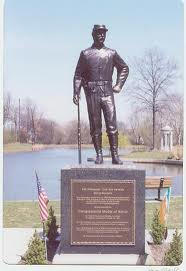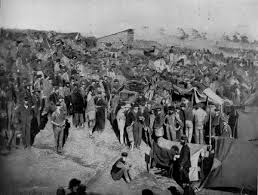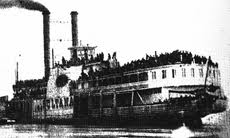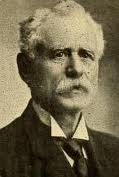 Irish Pennsylvania Patriot, Michael Dougherty was not only a Union Hero of the Civil War, but established a legacy of fortitude and survival that remains astonishing in the extreme. Any war brings out the best and the worst in its combatants, some however, exhibit an extraordinary, almost immortal resiliency, overcoming all obstacles, no matter how overwhelming. One such Civil War trooper was Irish immigrant Michael Dougherty.
Irish Pennsylvania Patriot, Michael Dougherty was not only a Union Hero of the Civil War, but established a legacy of fortitude and survival that remains astonishing in the extreme. Any war brings out the best and the worst in its combatants, some however, exhibit an extraordinary, almost immortal resiliency, overcoming all obstacles, no matter how overwhelming. One such Civil War trooper was Irish immigrant Michael Dougherty.
Michael Dougherty was born in 1844 in Falcarragh, County Donegal, Ireland. He was the youngest of seven children and at 15 years old, he and his family emigrated to the United States. As a young Irish immigrant, Dougherty was working at a Philadelphia hotel when the Civil War broke out and enlisted when he was 18. On August 18, 1862, Michael Dougherty joined the 13th Pennsylvania Cavalry for a three year tour. This unit became known as the Irish Dragoons and it eventually became the 117th Regiment(13th Cavalry) and its first colonel was James A. Gallagher. This regiment fought at Antietam in 1862, Cedar Creek, Winchester, Strasburg, Middletown and Fisher’s Hill in 1863.
On February 26, 1863, Dougherty, as a dispatch rider in the Shenandoah Valley, his detachment encountered Confederate raiders. A deadly engagement ensued and after Dougherty’s horse was shot out from under him, he and 50 of his fellow Irish troopers were taken prisoner. Michael Dougherty was taken to Libby Prison in Richmond. After 3 months of imprisonment, Dougherty was exchanged on May 26, 1863 and rejoined his regiment at Winchester.
On October 12, 1863, the 13th Pennsylvania found themselves at Jefferson, Virginia, on the south side of the Rappahannock. At daylight, the Confederates attacked their positions, with heavy skirmishing continuing throughout the day and eventually the 4th Pennsylvania Cavalry moved up to support their comrades from the Keystone State. During this fighting the young Irish immigrant once again showed his worth when he dashed across an open field at the head of some men, forcing the Confederates to abandon one of their positions in an unoccupied house. Dougherty and his fellow troopers captured the dwelling and repelled repeated attacks throughout the day. The Confederates reinforced their position and by early evening Michael Dougherty and his comrades were cut off and could not escape across the river. The 13th Pennsylvania had lost 163 men, the majority captured by the overwhelming Confederate forces and Dougherty was again a prisoner of the Confederacy. In his dispatch notebook Michael Dougherty memorialized his capture;
“At 5 p.m. we were overpowered, cut off from the division and 127 of our regiment, among whom was your humble servant, were compelled to surrender. All the prisoners were dismounted. The enemy proved to be the advance of General Lee’s army. Remained prisoner at Jefferson all night.”
For the next 23 months, October 1863 thru April 1865, Michael Dougherty would remain a prisoner in different camps in the South. Of the 127 Union soldiers taken prisoner with him, he was the sole survivor. One hundred and twenty-two of his comrades died. His journal of daily survival in the infamous stockade at Andersonville, Georgia, chronicles the horrors that the inmates endured, including death, suffering and cruelty.
While a prisoner at Libby Camp in Richmond, Virginia, the young Irishman relates;
“The very name of Libby has become synonymous with that of terror. It carries tyranny and oppression in its simple sound. . . Fierce hate and revenge range supreme here, and consequently there is wrought out a system of discipline which produces a condition such as we might expect when the discordant elements of beings range unchecked, and we are surprised to find the culmination reached in almost fiendish expression.”
 While at Andersonville, Dougherty records events of the day;
While at Andersonville, Dougherty records events of the day;
“April 18, 1864: About five hundred more prisoners came in to-day from Cahaba, Alabama. Bernard Tolen, Co. D, died to-day.
May 4, 1864: Six men shot within the last week. A Yankee made believe he was dead last night and allowed himself to be carried out to the dead house on a stretcher, and was laid alongside the dead. I hope the fellow will get inside our lines but very few escape the bloodhounds.
May 13, 1864: John Moore of my company died today. About 50 prisoners today from Dalton. They say Dalton is in the hands of our army and that Sherman is marching on Atlanta. The average deaths for the last week has been about 50 per day.
May 15, 1864: We can see wagons haul away bodies from the dead-house, like so much dirt; as many as twenty bodies piled on one wagon. Upwards of fifteen hundred men have died since we came here.
July 20, 1864: One hundred and thirty prisoners died yesterday; it is so hot we are almost roasted. There were 127 of my regiment captured the day I was, and of that number eighty-one have since died, and the rest are more dead than alive; exposure and long confinement is doing its work among us.
November 13, 1864: All the Irish who could walk were called to the gate this afternoon by a Colonel McNeill of the 10th Tennessee (Rebel) Regiment, to see if any of them would take the oath to join the rebel service. Not an Irishman enlisted but two Yankees did, one from Connecticut and the other from a New York regiment; so you see the Irish are the most loyal.”
Michael Dougherty’s last entry is dated;
December 10, 1864: “I feel no better. My diary is full; it is too bad but cannot get any more. Goodbye all; I did not think it would hold out so long when I commenced.
Yours sufferingly, Michael Dougherty, Co. B, 13th PA. Volunteer Cavalry. Confederate State Military Prison Hospital.”
Against all odds, or with the Luck of the Irish, Dougherty survived and was released from Andersonville Prison on April 12, 1865. Some estimates of the survival rate of this Georgia prison conclude that one-quarter of the 45,613 prisoners who entered did not leave it alive.
 Dougherty and over 4,000 other freed prisoners made their way to the Mississippi River at the Port of Vicksburg. On April 23, 1865, Michael Dougherty boarded a ship called the Sultana along with over 2400 other passengers, Union Veterans and many former Andersonville prisoners. The steamer was bound for St. Louis, Missouri, and had arrived in Memphis, Tennessee on April 26, when early the next morning one of the boilers on the ship exploded, 1800 souls perished, but Dougherty, incredibly, was blown free of the conflagration, swam ashore, made his way to Bristol, Pennsylvania and was reunited with his family.
Dougherty and over 4,000 other freed prisoners made their way to the Mississippi River at the Port of Vicksburg. On April 23, 1865, Michael Dougherty boarded a ship called the Sultana along with over 2400 other passengers, Union Veterans and many former Andersonville prisoners. The steamer was bound for St. Louis, Missouri, and had arrived in Memphis, Tennessee on April 26, when early the next morning one of the boilers on the ship exploded, 1800 souls perished, but Dougherty, incredibly, was blown free of the conflagration, swam ashore, made his way to Bristol, Pennsylvania and was reunited with his family.
He was discharged on June 27, 1865 at Spring Mill, Pennsylvania, Dougherty was only 21 years old when he returned to Bristol. On the date of his enlistment in the Union Army he weighed in at 150 pounds and over a period of 23 months in Southern Prison Camps, his weight had dropped to less than 100 pounds.
Dougherty would marry Rose Magee and fathered 12 children. He was employed at the U.S. Mint in Philadelphia and was elected as a Bristol Council Member between 1880 and 1882.
 Michael Dougherty was awarded the Medal of Honor, 33 years after his acts of heroism, on January 23, 1897, for his daring, on the date of his capture, October 12, 1863. The citation reads;
Michael Dougherty was awarded the Medal of Honor, 33 years after his acts of heroism, on January 23, 1897, for his daring, on the date of his capture, October 12, 1863. The citation reads;
“Rank and organization: Private, Company B, 13th Pennsylvania Cavalry. Place and
date: At Jefferson, Va., 12 October 1863. Entered service at: Philadelphia, Pa.
Born: 10 May 1844, Ireland. Date of issue: 23 January 1897. Citation: At the
head of a detachment of his company dashed across an open field, exposed to a
deadly fire from the enemy, and succeeded in dislodging them from an unoccupied
house, which he and his comrades defended for several hours against repeated
attacks, thus preventing the enemy from flanking the position of the Union
forces.”
On the 50th anniversary of the battle of Gettysburg, Dougherty was asked to speak on the trials of being a prisoner at Andersonville. Instead, the Irish immigrant, related the events of the night of his capture and the details of the engagement that resulted in his Medal of Honor commendation, Michael Dougherty simply stated;
“We fought as long as we had any ammunition.”
Michael Dougherty died at the age of 86, in 1930 and was laid to rest next to his wife Rose, who died in 1906. This immigrant was not only an Irish Pennsylvania Patriot, but Michael Dougherty was truly a great Union Hero.
Bummer
Bummer would like to acknowledge and thank Mr. John Roark for suggesting the fascinating Civil War saga of this true American Hero!


Great story, eh? Michael Dougherty was obviously one tough critter. I wrote their regimental history and published it in 2000. “One Good Regiment” is NOT a work of fiction, and the quotes are well footnoted. One item I’d like to point out is that Colonel Galligher actually signed his name with an “i” and NOT an “a” as it is so often seen. sonnyhand@yahoo.com
Sonny
Thanks for sharing and Bummer will add your Regimental History to the must read list.
Bummer
I’ve long heard it said that the U.S. Army in the 19th century was heavily composed of immigrants, especially from Ireland. Dougherty was one of several Irishmen who fought for the Union. On the other side, Patrick Cleburne was an Irish immigrant Confederate general.
Louis,
Thousands of Irish immigrants fought during the Civil War, on both sides. Louisiana had the Irish Tigers. Several other states in the Confederacy fielded Irish units.
Bummer
04/17/13 Bummer-
Thanks much for this particular excellent ‘feature’ on “Michael Dougherty’s” epic CW story!
Further info and details of “Michael Dougherty” life can be found on his family tree on http://www.ancestry.com including a link to his privately published “Prison Diary”.
This rare and unique personal Civil War Diary, privately published by his son in 1911, is amazing and is indeed incredible story of extreme hardships, endurance, and survival across the canvas of the Eastern and Western Theaters in the Civil War. Michael Dougherty expresses much admiration for the kindness of two Confederate Chaplains,both Irish-born Catholic Priests, from the Diocese of Augusta,GA who ministered to the Union Prisoners at Andersonville’s prison hospital.
John,
Thank you for suggesting Michael Dougherty. Such a pleasant ending is so rare in most Civil War tales. A great beginning, middle and end. A pleasure to detail. Thanks again for bringing an Irish success story to “this student’s” attention.
Bummer
What a great story. Thank you for sharing the story of Pvt. Dougherty, so glad he was given the Medal of Honor.
I don’t know how he survived for that long in Andersonville. I’m still mad at Georgia for the barbaric concentration camp known in Andersonville. We often stop at Visitor Centers in Georgia, and I like to ask the tourist directors for fliers on Andersonville. They often hide them from public display by keeping them behind the desk. Once an old gentlemen tried to re-direct me to their “War between the States” tour stops. I wouldn’t have any of his propaganda, and he finally found the brochure on the National site of Andersonville. As you can tell, this part of the country is still not over the Civil War.
Btw, a couple of years ago, a lady at Toastmasters International shared a story of her great-great grandfather in Michigan. He had 14 children and they were poor as church mice. He enlisted in the Union and ended up here in Tennessee. He was captured and sent to Andersonville. He left Andersonville and boarded the Sultana, where he was killed in the explosion. His widow could not afford their children and the family was torn apart with the children going to various homes. Today, this lady is working on genealogy to locate her missing long lost relatives. What a sad story, I hope she has success with her work.
Sandy,
Glad you enjoyed the story. Sometimes these tales have a happy ending. God gives folks a desire to survive untold odds. A strong faith is sometimes the only thing that pulls one through. Sure enjoyed the trip to Tennessee. One day some research was accomplished in Sweetwater, at lunch, a lady that resembled your picture on Facebook was eating at a nearby table. (It could have been your sister.) Anyway, Bummer and wife were so impressed with the folks and beauty of the Smoky Mountains, it may be our next destination.
Take care.
Bummer